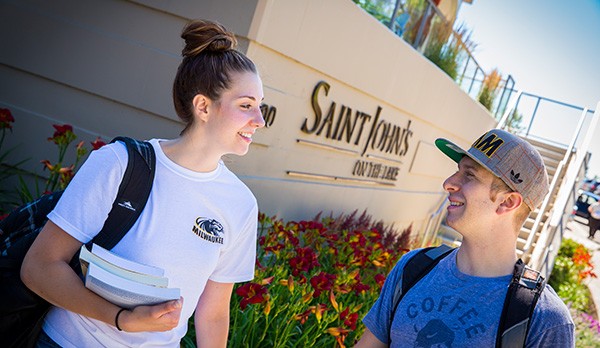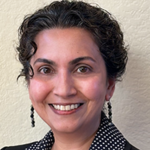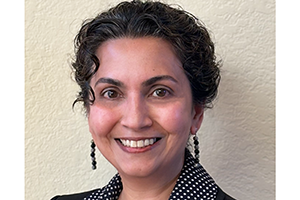
Can something as simple as hearing a first-person story change how the next generation views older adults?
UWM and a neighboring retirement community are betting the answer is yes.
The two have partnered to create an undergraduate course on aging to be held at Saint John’s on the Lake, a continuing care community, and taught, in part, by its residents this fall.
“Looking at the syllabus, some of the sessions screamed, ‘Stories! Stories! Stories!’”
– Donna Spars
Vice President,
St. John’s on the Lake
Students in the Aged to Perfection course will skip the classroom and instead meet weekly at Saint John’s, where residents will serve as panel presenters, small group facilitators and storytellers. The goal is to help students see the value, strengths, and contributions of senior citizens and encourage them to continue studying aging and gerontology.
Research shows that undergraduate students are reluctant to choose careers in aging. This reluctance stems from a lack of knowledge about aging (including its positive aspects) and limited contact between the generations, said Aged to Perfection creator Rachelle Alioto, director of education and programming at UWM’s Center for Aging and Translational Research. She hopes the experience this fall will benefit both students and St. John’s residents.
“How today’s students view aging matters to the well-being of older adults and will matter later to their own generation,” she said.
Jean Tyler, retired from a career in government policy research, and Dan Patrinos, a retired journalist, helped plan Aged to Perfection. Tyler wanted to interact more with young people, while Patrinos hoped better education would lead to policy and program changes involving older adults.
The two discussed ways for residents to contribute. “It wasn’t teaching,” Tyler said. “That’s a commitment we couldn’t live up to. Health problems often mean our lives are subjected to interruptions we can’t control.”
Their best role, they decided, was to discuss age-related issues with students, matching selected residents with syllabus topics that include societal prejudices toward older adults, life transitions, and how aging affects relationships, spiritual beliefs, memory and physical health.
“How today’s students view aging matters to the well-being of older adults and will matter later to their own generation.”
– Rachelle Alioto
Director,
Center for Aging and
Translational Research
Many Saint John’s residents helped shape the course, Alioto said. “I started with a skeletal outline – just an idea for the syllabus. Then I met with retired professors who live at Saint John’s and got feedback.”
Just like people, the course changed a little at a time, and by the end, it had changed significantly.
While students will have the usual homework, class meetings will focus on residents’ personal stories.
“Stories are so powerful to learning,” said Saint John’s Vice President Donna Spars, who will teach two of the classes. “They are part of the human experience and relate emotion and humanity. Looking at the syllabus, some of the sessions screamed, ‘Stories! Stories! Stories!’”
So come fall, when 20 or so college students gather in a room at Saint John’s, Patrinos will be there to share his concerns about end-of-life issues and stereotyping of older adults. Tyler talk about the losses she’s experienced, including a spouse, parents and dear friends, as well as physical strength, ease of access to memories, and the loss of opportunities that comes with being older.
Such stories, Alioto hopes, will sensitize students to the difficulties older people face, challenge prejudices, and illustrate seniors’ strengths and contributions.
“I hope the students will see seniors differently than the normal stereotypes,” said Tyler, who describes herself as curious, open and having an indispensable sense of humor. “This is a chance to have us viewed differently and to share with students some of the remarkable diversity among our community’s residents.
“Besides,” she said, “I love it when college-age kids get together. It challenges the way we think.”






